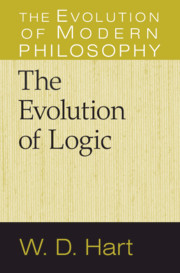Summary
Preface
In high school I read a book from the school library called Introduction to Mathematical Thought by E. R. Stabler. Early on he described a pattern in which he displayed a conditional, its antecedent, and its consequent. I stared at this display, trying to get the point. Then the penny dropped: this is a way the mind moves, from the first two to the third. That was my first experience of explicit logic, and it was eye-opening.
I took my first logic course at university from W. V. Quine. He lectured by mumbling at his stack of three-by-five cards, but the textbook was the second edition of his Methods of Logic, which I still think is the best baby logic book I have seen. As I learned gradually who Quine was, I was too awestruck to approach him again. Instead, I did a lot of work with his former student Burt Dreben. Dreben described himself as a logical positivist, but he was really a philosophical nihilist. He once said in lecture, “Rubbish is rubbish, but the history of rubbish is scholarship.” The rubbish was all of philosophy, and the scholarship was where he wanted me directed. He taught us a lot of logic and early analytic philosophy. He first taught me Gödel’s incompleteness theorem from Rudolf Carnap’s The Logical Syntax of Language, and he later taught it from Gödel’s original paper. Both now seem to me perverse pedagogy, especially the first, but it reflected his historical taste.
- Type
- Chapter
- Information
- The Evolution of Logic , pp. ix - xiiPublisher: Cambridge University PressPrint publication year: 2010



